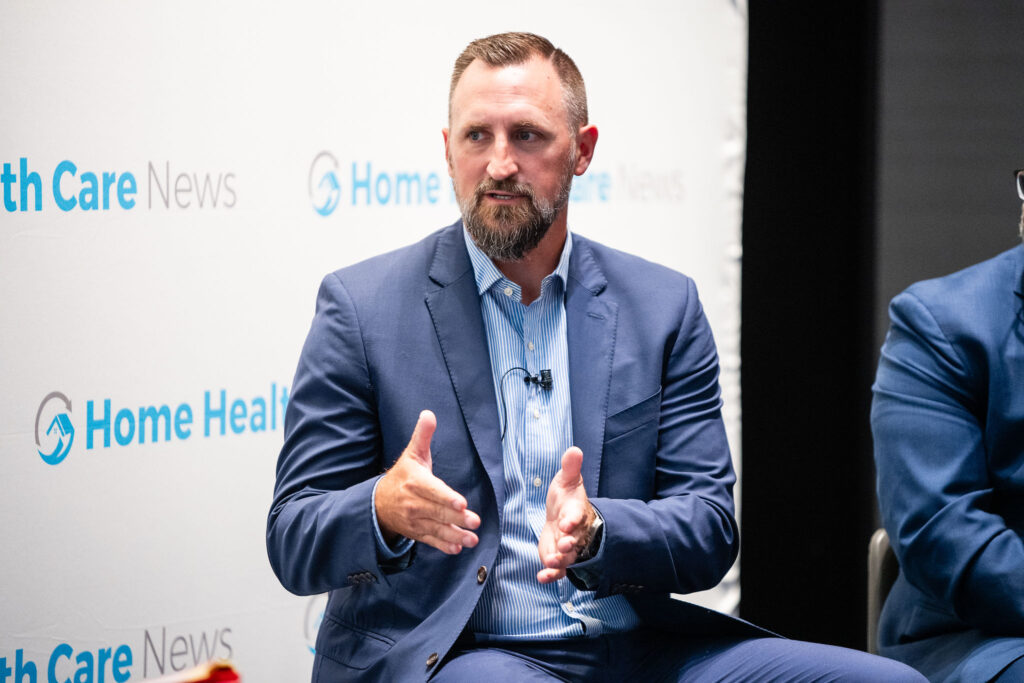In the face of fluctuating regulations, including Medicaid budget cuts and the proposed companionship exemption, home care providers are taking action to improve efficiency and educate lawmakers.
Medicaid reimbursement rates play a pivotal role in shaping how home care providers sustain their businesses and manage investments – including decisions around overtime pay – according to experts at Home Health Care News’ FUTURE conference.
The One Big Beautiful Bill Act (OBBA) could lead to CMS “tightening its belt,” Evan Worrell, senior director of operations at Modivcare, said, and lead to reduced hours for home care. Providers must therefore focus on efficiency.
“We have to do what we’re doing the right way and utilize technology and AI, for example,” he said. “What we’ve worked with our staff on is that we’re going to be the partner to help through those redeterminations. We’re working with our clients to understand the changes that are coming down and letting them know that we’re there with them through this change, and that will help advocate for them and help them with their paperwork, their appointments, whatever needs to happen.”
Denver, Colorado-based Modivcare provides non-emergency medical transportation, personal care services and remote patient monitoring solutions, reimbursed through value-based arrangements. In August, the company announced that it had filed for Chapter 11 bankruptcy and was delisted from the Nasdaq.
The bill has not yet majorly impacted access to care, according to Kunu Kaushal, the CEO of Senior Solutions.
“There has been the most fear I’ve ever seen around the details that don’t exist,” he said. “Let me define that. People just assume that with the bill, Medicaid in general, with the seniors and persons with disabilities and pediatric patients, that they were going to be impacted in a big way. I have … yet to see that. I do see those individuals who are more on the Medicaid health plan, they are going to be impacted much more in different ways.”
Brentwood, Tennessee-based Senior Solutions Home Care provides personal care services, transportation solutions and nutrition support, among other offerings. The company serves 95 counties in Tennessee and 15 counties in Georgia.
The bill will lead to increased scrutiny of care, authorizations and determinations, Kaushal said, but is unlikely to significantly alter benefits.
The OBBA could also include error rate changes, Worrell said.
“What’s happening is that you’ll have a lot of shifting of dollars going on to the states into their administration, which will cause a lot of problems and fears,” Worrell said. “We’ve been fortunate in West Virginia, for example, we put more money into the home- and community-based services line items this past year to increase rates and so that – which is a good thing – but with the administrative side and the error rates changing, it potentially harm that.”
Ultimately, providers must focus on the messaging that home-based care saves Medicaid dollars, Worrell said.
DOL’s companionship exemption
Senior Solutions believes the companionship exemption, which the U.S. Department of Labor (DOL) proposed reinstating in July, is “critical”. While some industry stakeholders have advocated against the exemption, which would make some personal care workers exempt from federal minimum wage and overtime protections, Kaushal stated that it would allow providers to be flexible and innovate their staffing solutions.
The ability to innovate varies dramatically between states. Some states, like Tennessee, have taken a more restrictive stance on overtime and minimum wage rules.
With the exemption, Senior Solutions will likely not stop paying for overtime, he said. When the company was founded in 2010, Kaushal said, overtime was its key differentiator between its peers.
“Now, many years later, having that exemption is critical, because the reimbursers themselves are saying, ‘Hey, our budgets are strapped,’” Kaushal said. “We fight for reimbursement every day. Caregiver wage is being talked about, and yet the state doesn’t compensate for overtime. They tell us it’s a ‘you’ problem, as agencies, to go figure it out. I think having options for the exemption is really positive. I think organizations will make a decision based on their payer mix and how they want to identify that. I think it’s become complicated once you now layer on the no tax on tips and overtime.”
Human resources teams will have to “figure out” the narrative around communicating changes with overtime, Kaushal said, because of the potential challenges for caregivers.
Ultimately, caregivers do not make enough money, Worrell said, so the company has increased overtime and does not account for the exemption.
“It’s all tied to that reimbursement rate,” Worrell said. “Some of the states do not compensate for overtime, and not even that, their additional reimbursement rates don’t even cover an overtime rate. So the exemption is important in some of the states. We’ve been fortunate enough to advocate for rates that have been well over what an overtime would be. So we are actually encouraging, increasing over time and continuing to pay that overtime rate and not taking into account that the exemption exists.”
Improving reimbursement rates requires educating lawmakers, Worrell said, and they are quick to see the need for increased Medicaid reimbursement when they learn the cost-saving nature of home care.
One tactic to educate lawmakers, Kaushal said, is to invite a state representative, local legislator or Senator to shadow a home care worker.
“This is one of those incredible experiences,” he said. “And by the way, they are willing to do it. We all [are] a little bit shy, and we think they’re doing really important work, for them to see the story of what’s happening … that is how they understand the work that we do, and they don’t look at it as just a line item.”
The post Reduced Hours, Companionship Exemption Nuance: The Regulations Requiring Home Care Innovation appeared first on Home Health Care News.







